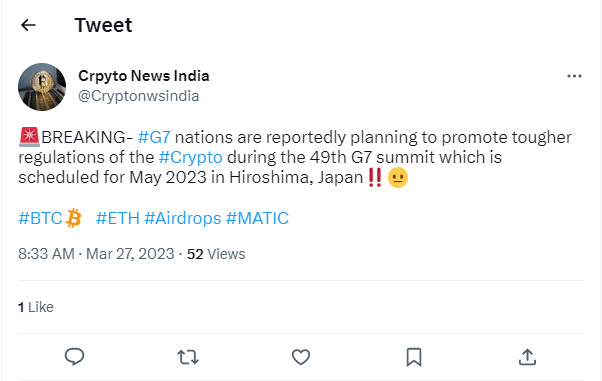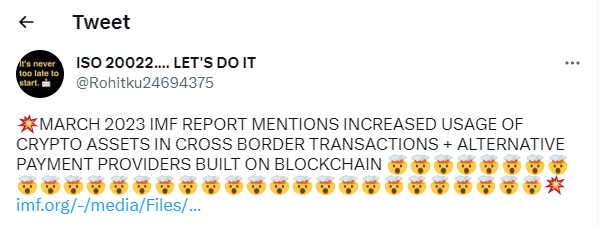Join Our Telegram channel to stay up to date on breaking news coverage
Leaders from the Group of Seven (G7) countries are reportedly planning to announce a joint strategy for regulating digital assets in May. The plan is expected to promote international cooperation and implement stricter cryptocurrency regulations.
During the upcoming G7 meeting on March 25, the leaders of the seven largest democratic countries in the world are expected to collaborate on implementing stricter global regulations for cryptocurrencies. The goal is to:
- Promote transparency in the crypto industry
- Enhance consumer protections
- Address potential threats to the international financial system
The initiative is set to be officially announced at the G7 summit, scheduled for May in Hiroshima.

Japan has already put in place regulations for cryptocurrency. Similarly, the European Union’s Markets in Crypto-Assets (MiCA) regulation is slated to become effective in 2024. The United Kingdom is developing its cryptocurrency framework. It includes creating a specific category for crypto assets in tax forms and plans for a digital version of the pound. Canada treats digital assets as securities.
In the United States, existing financial regulations are currently applied to cryptocurrencies, and lawmakers may introduce a regulatory framework for crypto soon.
IMF Advocates for More Extensive Crypto Regulation and Interoperable CBDC Platform
The Financial Stability Board (FSB), the International Monetary Fund (IMF), and the Bank for International Settlements (BIS) are working towards creating standards for digital assets. In February, the G20, comprised of the world’s 20 largest economies, announced they collaborated towards this goal.
By July and September, recommendations are expected to be made on regulating and supervising global stablecoins and the crypto asset markets. However, it is unclear what the overall approach to these recommendations will be.
The IMF has released an action plan on crypto assets, which recommends that countries remove the legal tender status of cryptocurrencies. This recommendation from the IMF is unsurprising, as it has previously expressed concerns about using crypto as an official currency, mainly after El Salvador adopted Bitcoin as a legal tender in 2021.

Despite this, the IMF calls for more comprehensive regulation of crypto assets. Additionally, the IMF is working on a platform that can connect different central bank digital currencies (CBDCs) to facilitate cross-border transactions.
U.K. Treasury Announces Crypto Assets Category in Tax Return Forms from 2024-25
The U.K. government is working on establishing a comprehensive framework for crypto assets, and they have introduced a separate category for these assets in tax return forms. Starting from the tax year of 2024-2025, British citizens must declare their crypto assets on the amended self-assessment forms.
The Chartered Institute of Taxation (CIOT) welcomed this move. Still, it stressed the need for additional measures to address the lack of understanding among low-income crypto investors regarding tax payment and reporting requirements.
The Financial Conduct Authority (FCA) has informed the Treasury that it is undergoing a reset as the Financial Services and Markets Bill passes through Parliament, giving the FCA new regulatory powers over the cryptocurrency industry if passed.
More News:
The Sandbox Teams Up With Ledger Enterprise To Secure Brands In The Metaverse
German Dwpbank To Offer Crypto Training To Affiliates
Binance Staff Allegedly Assisting Chinese Customers Evade KYC Requirements
Best Wallet - Diversify Your Crypto Portfolio
- Easy to Use, Feature-Driven Crypto Wallet
- Get Early Access to Upcoming Token ICOs
- Multi-Chain, Multi-Wallet, Non-Custodial
- Now On App Store, Google Play
- Stake To Earn Native Token $BEST
- 250,000+ Monthly Active Users
Join Our Telegram channel to stay up to date on breaking news coverage


